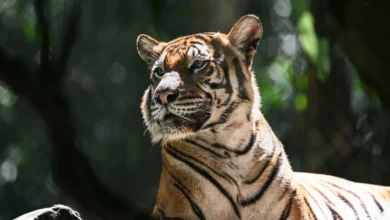World governments are set to agree on three big boosts for biodiversity and human security during the meeting of the UN Convention on Biological Diversity (CBD) currently underway in Japan. Set to run until 29 October, the meeting, known as the Conference of the Parties (COP) 10, brings together 195 nations to the CBD.
The CBD, which was created at the Rio Earth Summit in 1992, is an international legally binding treaty with three main goals: the conservation of biodiversity; the sustainable use of biodiversity; and fair and equitable sharing of the benefits derived from genetic resource use. Overall, it aims to encourage action that will lead to a sustainable future.
This is indeed a pressing issue after the UN announced earlier this year that our natural resources, or natural capital, are being lost at an alarming rate and urgent steps need to be taken to combat the destruction of plant and animal species that ensure mankind's survival. A UN-sponsored team of economists calculated that the loss of biodiversity and ecosystems will cost nations an estimate US$2-5 trillion a year.
In 2002 governments agreed to significantly reduce the loss of biodiversity by 2010–the reason why 2010 was designated the International Year of Biodiversity. But officials have failed to meet set targets, largely because they did not address the lack of awareness of the value of biodiversity. Moreover, officials neglected to incorporate the true costs of biodiversity loss into policy.
Though there has been growing awareness of the importance nature has for human health, livelihoods and national economies, the state of the natural world has continued to decline steeply, as revealed in the Global Biodiversity Outlook 3 report released in May 2010.
The 96-page report highlights the 21 sub-targets of the agreement. None were achieved globally and, instead, pressures on biodiversity in many instances have increased. As stated in the report “there are multiple indications of continuing decline in biodiversity in all three of its main components–genes, species and ecosystems.”
Unless sufficient public indignation can be elicited to avert further loss, the prevailing suspicion that humanity is incapable of looking after the planet will be confirmed, if current talks follow the failure precedent set by last year’s climate talks in Copenhagen.
As Mike Shanahan from the International Institute for Environment and Development (IIED) recently wrote, “[…] the meeting in Japan is not about safeguarding wildlife. It is about safeguarding humanity. This is the key point that is not being communicated well enough–that biodiversity includes us”.
Government officials from around the world currently in Nagoya, Japan are trying to make three key decisions that will determine whether current and future generations continue to benefit from the globe's natural wealth.
First, there is a comprehensive ten-year strategy, which, if enacted, would serve to revolutionize the way we manage and interact with the global milieu, while bringing immense social and economic benefits to people worldwide.
Second, negotiations will include the need for large financial flows to support developing countries that are asked to protect large areas of wilderness for the good of all humanity.
Finally, a new set of international rules should provide transparent access to the biological resources of the world while ensuring countries and communities get a fair share of any benefits that arise from their use.
Though Egypt is not particularly rich in biodiversity, its loss remains an important issue for Egyptians in light of the fact that the various values and vulnerabilities of biodiversity are global issues, which will affect us directly or indirectly.
Despite being mostly arid or hyper-arid, Egypt is home to a wide diversity of terrestrial habitats, fauna and flora due to its very varied eco-zones. Although relatively low in species numbers, the country hosts a great diversity of organisms.
Egypt is home to at least 800 species of non-flowering plants, 2302 flowering species and subspecies (62 endemic species and two threatened), 116 mammal species (13 threatened), 447 bird species (14 threatened) 109 reptile species (six threatened), nine amphibians and more than 1000 fish species. Invertebrates are varied. For instance, insect diversity ranges between five and ten thousand species, and there are more than 200 coral species, 800 mollusks, and more than 1000 crustaceans.
Threats to Egypt’s biodiversity include excessive hunting and cutting, globalization and its negative impacts on resource extraction, limited human and financial resources, and habitat degradation due to pollution from unsustainable agricultural and industrial use.
According to Egyptian environmental consultant Sherif Baha Eddin, if decline continues at a parallel with its current rate, Egypt will lose most of its biodiversity within 20 years. Already, half of the 500 plant species along Egypt’s Mediterranean coast have disappeared since development began along the shoreline. Much of the coastline has become an “urban wasteland,” says Baha Eddin. “Fifty percent of it is gone.”
Even more worrisome is the fact that in Egypt, stemming biodiversity is not a priority for the government. According to Dr. Osama Mohammad al-Tayeb, Professor Emeritus at the Faculty of Pharmacy, Cairo University, and Advisor to the Egyptian Biosafety Clearing House, “the Egyptian government has drafted plans but implemented nothing except for designating ‘protected areas’ which are often violated in the interest of, say tourist and land development activities.”
“Conceptually, Egypt is about 100 years behind the rest of the world including some of poorest countries of Africa," he adds. "Egypt is one of the very few countries which lack legislation on biodiversity. There is a lack of vision and sense of responsibility.”
More so, the outcome of the CBD meeting in Japan is crucial to put in place the necessary regulations to ensure countries like Egypt are, in fact, involved in trying to salvage humanity from the loss of biodiversity.




